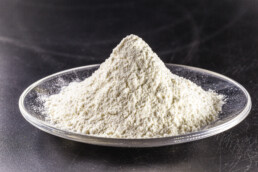Cosmetics and make-up, mining, pharmaceutical and veterinary industry, third party food packaging… Micronisation – also known as grinding – is used in many industrial fields, as it is an essential process for the handling of solids used in the production of certain raw materials. What is this process? What micronisation systems are used by specialists?
What is micronisation?
Micronisation is a physical process that reduces the particles of a material to sizes no larger than 10 microns. To get an idea: 10 microns is equivalent to 0.01 millimetres.
Due to the impact these particles undergo when circulating at high speed, they collide with other particles inside a chamber, generating micrometre-sized dust.
How is a micron achieved by this process?
The latest micronising systems are designed in the form of high-speed mills. This type of system is able to grind even medium and low-hardness products as well as wet substances. The best example of this is the compact and robustly designed lump grinding mill.
Other dry grinding technologies, such as continuous ball mills, work by friction between the balls, the inner surface of the mill and the raw material.
Why is micronisation so useful for industry?
As specialists in third-party packaging systems in the food industry, specific pre-crushing, grinding and milling operations for solids, we know how useful the micronising process is. Micron reduction of powders and materials below 100 μm is a growing trend in the industry.
Let’s keep in mind that this process brings countless advantages for many companies. In the pharmaceutical sector, for example, it facilitates bioavailability (i.e. the speed of absorption of a drug or active ingredient), but also a better adhesion, a long-lasting and silky effect for other industries such as cosmetics.
Finally, at Solimix we would like to remind you that we have more than 40 years of experience in offering customised packaging services to third parties in the food industry, as well as in the processing of solid products with excellent quality levels. Moreover, as we have a flexible infrastructure, we can carry out specific grinding, milling and micronising operations. In short, we adapt to all the processes necessary to obtain the formulation defined by each of our customers.


